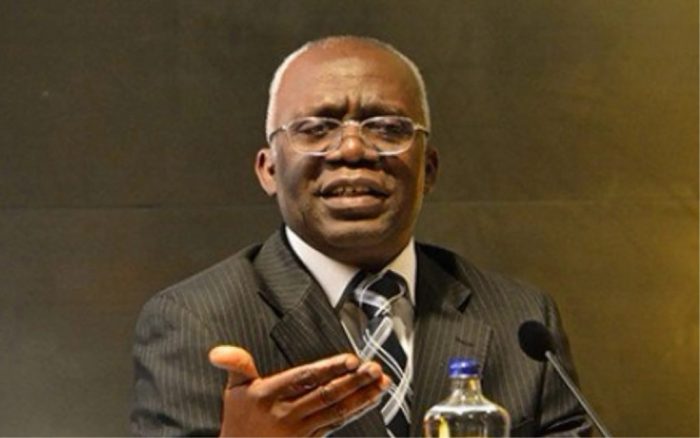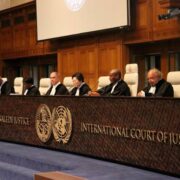List Of INEC REC Nominees Is Constitutionally Defective, Says Falana

Lawyard is a legal media and services platform that provides…
Human Rights Lawyer Femi Falana, SAN, has faulted the nomination of 14 persons for confirmation as Resident Electoral Commissioners for the Independent National Electoral Commission (INEC).
In a statement on Sunday, Falana said President Muhammadu Buhari failed to comply with the provisions of the Constitution in nominating the 14 persons.
According to him, the President had previously consulted the Council of State to appoint the Chairman and members of INEC in compliance with the provisions of Section 154 (3) of the Constitution.
“On each occasion, the President consulted the Council of State before submitting the names of nominees to the Senate for confirmation in line with Section 154(1) of the Constitution,” he said.
“But for some undisclosed reasons, the President has forwarded the nominations of 14 persons for confirmation as Resident Electoral Commissioners without any prior consultation with the Council of State.”
The nominations have since generated controversy as some of the nominees have been accused of being members of the President’s party, the All Progressives Congress.
Some groups, including civil society organisations, have also condemned the nominations, saying they amounted to discrimination against women.
According to Falana, the move also contradicted the promise of the President to ensure a free and fair general election next year.
“Apart from the constitutional infraction, the list of the nominees has been challenged on the ground that some of them are card-carrying members of the ruling party,” he said.
“At least two other nominees are alleged to be under investigation for serious electoral malpractice. Instead of subjecting the nominees to integrity test, the Federal Government has dismissed such grave allegations with a wave of the hand.”
Another issue the Senior Advocate had with the nominations was the percentage of women on the list.
He said, “In view of the opposition to the list of nominees by a number of women’s groups on (the) ground of gender discrimination, it is pertinent to draw the attention of the President to the judgment delivered by the Federal High Court on April 10, 2022, in the case of Women Empowerment and Legal Aid & Ors v Attorney-General of the Federation (Suit No FHC/ABJ/CS/ 2021) wherein the Honourable Justice Donatus Okorowo ordered the federal government to comply with the 35 per cent affirmative action for women, which allows women to occupy 35 per cent of all appointments.
“Since the judgment is binding on all authorities and persons in Nigeria pursuant to section 287 of the Constitution the President should ensure that the women in the list of nominees should not be less than 35 percent.”
Read his full statement below:
Since 2015, President Buhari had consulted the Council of State whenever he wanted to appoint the Chairman and members of the Independent National Electoral Commission including Resident Electoral Commissioners in strict compliance with the provisions of Section 154(3) of the Constitution of the Federal Republic of Nigeria, 1999. On each occasion, the President consulted the Council of State before submitting the names of nominees to the Senate for confirmation in line with Section 154(1) of the Constitution. But for some undisclosed reasons, the President has forwarded the nominations of 14 persons for confirmation as Resident Electoral Commissioners without any prior consultation with the Council of State.
Apart from the constitutional infraction, the list of the nominees has been challenged on the ground that some of them are card-carrying members of the ruling party. At least two other nominees are alleged to be under investigation for serious electoral malpractice. Instead of subjecting the nominees to integrity test, the Federal Government has dismissed such grave allegations with a wave of the hand.
Curiously, the Minister of Information and Culture, Mr. Lai Mohammed (who had been in the forefront of the campaign for electoral reforms before 2015) said last week that, “As to the nominees that are being challenged by social media warriors and by some critics, I don’t think it is the business of the President to immediately throw out a nominee based on allegations which have not been proven.”
Having repeatedly assured the Nigerian people that the Administrators will support the Independent National Electoral Commission to conduct credible elections in 2023 we call on President Buhari to withdraw the controversial list from the Senate and ensure that the nominees are investigated by relevant security agencies. After security clearance, the President is advised to comply with section 154(3) of the Constitution by consulting the Council of State with respect to the qualification and competence of the nominees. It is after the consultation that the names of the nominees that are qualified should be presented to the Senate for confirmation.
However, in view of the opposition to the list of nominees by a number of women’s groups on ground of gender discrimination it is pertinent to draw the attention of the President to the judgment delivered by the Federal High Court on April 10, 2022, in the case of Women Empowerment and Legal Aid & Ors v Attorney-General of the Federation (Suit No FHC/ABJ/CS/ 2021) wherein the Honourable Justice Donatus Okorowo ordered the federal government to comply with the 35 per cent affirmative action for women, which allows women to occupy 35 per cent of all appointments. Since the judgment is binding on all authorities and persons in Nigeria pursuant to section 287 of the Constitution the President should ensure that the women in the list of nominees should not be less than 35 percent.
Femi Falana SAN,
Chairman,
Alliance on Surviving Covid 19 and Beyond (ASCAB).
September 11, 2022.
Lawyard is a legal media and services platform that provides enlightenment and access to legal services to members of the public (individuals and businesses) while also availing lawyers of needed information on new trends and resources in various areas of practice.













